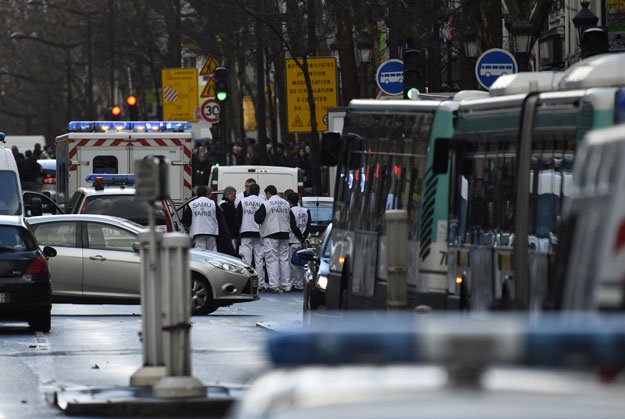
The man reportedly shouted "Allahu Akbar" (God is Greatest) and was carrying a knife and possibly wearing what appeared to be an explosives vest, the interior ministry said.
A year on, Charlie Hebdo attack seen as start of series of militant outrages in France
News of the attack came just after President Francois Hollande concluded a sombre speech at police headquarters to mark the anniversary of the killings at Charlie Hebdo's offices on January 7, 2015.
"On Thursday morning, a man attempted to attack a policeman at the reception of the police station before being hit by shots from the police," said interior ministry spokesperson Pierre-Henry Brandet.
Explosives experts were deployed to the scene in the multi-ethnic Goutte d'Or district, close to the Gare du Nord international station, the source added.
With France also still grieving from the massacre of 130 people by militants in Paris in November, Hollande used his speech to call for greater cooperation between the security services.
"Faced with these adversaries, it is essential that every service -- police, gendarmerie, intelligence, military -- work in perfect harmony, with the greatest transparency, and that they share all the information at their disposal," the president said.
Many of the attackers in both January's rampage and the attacks in November were known to French security services, having either travelled abroad to fight with extremists or been prevented from doing so.
Hollande said that since the attack on Charlie Hebdo, nearly 200 people in France had been placed under travel restrictions to prevent them joining up with IS in Syria or Iraq.
A year after 'Je suis Charlie', a divided France struggles
The president said the three police officers killed in January's attacks "died so that we could live in freedom".
A police bodyguard tasked with guarding the newspaper's editor, Charb, was killed alongside him by brothers Cherif and Said Kouachi and in scenes caught on film the brothers shot dead another policeman, Ahmed Merabet, as he sprawled on the pavement near Charlie Hebdo's offices.
The next day, a policewoman was shot dead by Amedy Coulibaly in the southern suburb of Montrouge, apparently as he was heading to attack a Jewish school.
Among changes set to be introduced in the wake of the November attacks are new guidelines allowing police to keep their weapons even when off-duty.
The president reiterated his pledge to boost the number of police and armed gendarmes by 5,000.
The speech will be followed by a concert on Sunday to mark the one million people who poured on to the streets of Paris on January 11, 2015, in an outpouring of support for freedom of expression in the wake of the deaths of Charlie Hebdo's best-known cartoonists.
The newspaper had been in the militants' sights since it first published cartoons of the Prophet Muhammad (pbuh) in 2006.
The widow of Franck Brinsolaro, the bodyguard who was killed in the attack, said this week she has filed a lawsuit claiming that he was left vulnerable because the security around the newspaper had been reduced before the shootings.
Charlie Hebdo has continued to raise ire, rejecting self-censorship in the wake of the attacks and working from ultra-secure offices in a top-secret location.
On Wednesday it published a typically provocative special edition featuring a gun-toting God, sparking protests from the Vatican.
The cover of the anniversary edition features a bloodstained, bearded God figure in sandals with a Kalashnikov rifle slung over his shoulder under the headline: "One year on: the killer is still at large."









1732354127-0/Untitled-design-(3)1732354127-0-270x192.webp)







COMMENTS (11)
Comments are moderated and generally will be posted if they are on-topic and not abusive.
For more information, please see our Comments FAQ